 Petzlover
Petzlover Formosan Mountain Dog is originated from Taiwan but Gordon Setter is originated from United Kingdom. Formosan Mountain Dog may grow 18 cm / 7 inches shorter than Gordon Setter. Formosan Mountain Dog may weigh 18 kg / 39 pounds lesser than Gordon Setter. Both Formosan Mountain Dog and Gordon Setter has same life span. Formosan Mountain Dog may have more litter size than Gordon Setter. Formosan Mountain Dog requires Low Maintenance. But Gordon Setter requires Moderate Maintenance
Formosan Mountain Dog is originated from Taiwan but Gordon Setter is originated from United Kingdom. Formosan Mountain Dog may grow 18 cm / 7 inches shorter than Gordon Setter. Formosan Mountain Dog may weigh 18 kg / 39 pounds lesser than Gordon Setter. Both Formosan Mountain Dog and Gordon Setter has same life span. Formosan Mountain Dog may have more litter size than Gordon Setter. Formosan Mountain Dog requires Low Maintenance. But Gordon Setter requires Moderate Maintenance
 The Formosan Mountain Dog is most often known as the Taiwan dog and it is a landrace indigenous to Taiwan. It is a small to medium breed of dog that was semi-wild at one time. The colonialization of Taiwan and other foreigners help to fully domesticate the Formosan Mountain Dog. They were found to be very trainable and uniquely suited for the terrain around Taiwan. The dogs were easy to train and now serve as hunting dogs, stunt dogs, guard dogs, rescue dogs, therapy dog and personal companions. There are three types of Formosans two smaller types and one medium. However, the original pure Formosan Mountain Dog is getting close to extinction again because the government and people have provided no protection or conservation efforts for them. These dogs have been living in Taiwan in the mountains and were called Formosan Mountain Dogs when Taiwan was known as Formosa. They come from a line of Southeast Asian hunting/gun dogs and they are considered ‘rare’ now.
The Formosan Mountain Dog is most often known as the Taiwan dog and it is a landrace indigenous to Taiwan. It is a small to medium breed of dog that was semi-wild at one time. The colonialization of Taiwan and other foreigners help to fully domesticate the Formosan Mountain Dog. They were found to be very trainable and uniquely suited for the terrain around Taiwan. The dogs were easy to train and now serve as hunting dogs, stunt dogs, guard dogs, rescue dogs, therapy dog and personal companions. There are three types of Formosans two smaller types and one medium. However, the original pure Formosan Mountain Dog is getting close to extinction again because the government and people have provided no protection or conservation efforts for them. These dogs have been living in Taiwan in the mountains and were called Formosan Mountain Dogs when Taiwan was known as Formosa. They come from a line of Southeast Asian hunting/gun dogs and they are considered ‘rare’ now.
According to historian Dr. Sung Yung-yi, the breed went through 4 major catastrophes that affected their development. The first of these was the Dutch Establishment in 1624. The Dutch colonized Taiwan and imported both people and dogs. The dog they brought in was called the Flying Dog and was either Greyhound or Pointer. Eventually, the Flying Dog bred with the Formosan Mountain Dog. This along with the slaughter of dogs belonging to the indigenous people by the government, starting the decline of the original Taiwan dog.
In 1895, it was the Japanese acquiring Taiwan following the First Sino-Japanese War. The Japanese bred the Formosan Mountain Dog extensively with the own Japanese dogs. This further diluted the line and authenticity of Taiwan dogs.
This was followed by World War II when German Shepherds traveled with the US Army and they cross-bred with the Formosan. This was the third major dilution of the Formosan Mountain dog line. At the same time, the Japanese government considered the Formosan Mountain Dog a sanitation threat and barbaric. They massacred them in large numbers in the name of sanitation.
The fourth and final dilution took place during the Kuomintang Era beginning in 1945 with the arrival of the Chinese Nationalist Party. They brought with them the culture of eating dogs. During this time the economy of Taiwan took off and business people began to import their own foreign dogs that were high priced purebreds. These dogs bred with the Formosan and other Formosans were just abandoned to die. The ranks of the breed became very thin indeed. Today’s pure Formosan is highly valuable and extremely rare. Because of all the crossbreeding over the centuries, today’s purebred Formosan Mountain Dog is very different from the Taiwan dog of old. Today’s Formosan is loved all over the island and is a companion and watchdog.
Today there is an effort by Taiwanese ecologists to put together a research project that would study and preserve the Formosan in its indigenous form. Dr. Yung-yi led this effort. He located only 46 dogs with a pure pedigree, 21 females and 25 males. They let the Food and Agricultural of the United Nations know and the dogs were labeled close to extinction. Reproducing from the indigenous dogs to purify and increase the breed was the goal. The government was not very supportive.
Today the Royal Air Force is looking at the Formosan Dog to use for military security. They are currently only using German Shepherds and needed another choice. It was decided that the Formosan Mountain Dog had a better sense of smell, dexterity, alertness, and hearing as well as better padding on their paws.
Through these efforts and those of foundation stock breeders and owners, the Formosan Mountain Dog in its indigenous form was brought back. Some call this dog a purebred Formosan while others consider it a new type. Standards were presented to the FCI for registrations as a purebred. This debate continues today
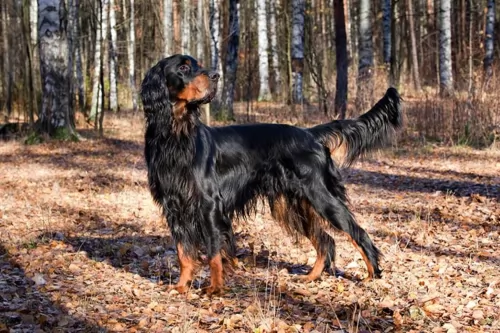 The Gordon Setter includes mixes of the English Setter and the Irish Setter. The original purpose of the breed was to hunt game birds.
The Gordon Setter includes mixes of the English Setter and the Irish Setter. The original purpose of the breed was to hunt game birds.
The dog breed hails from Scotland with a history that dates back to the 17th century. The dog was developed in Gordon Castle by the Duke of Gordon IV.
The dog became popular among hunters in the early 19th century. He is the biggest of the setter breeds. It was in 1884 that the American Kennel Club recognized the Gordon Setter.
 The Formosan Mountain Dog that was seen during Dr. Sung Yung-yi’s research is a medium-sized dog, athletic and fit. It has a deep chest and a slim waist. The ears are half-covered, the nose is black and there is a coating of black on the tongue. This black tongue is the most distinguishing attribute of the Formosan Mountain Dog. The breed has a strong jaw, the skull that is just slightly longer than the muzzle, which is flat and tapered, triangle face and almond eyes. They have a thick coat and upright, curved tail.
The Formosan Mountain Dog that was seen during Dr. Sung Yung-yi’s research is a medium-sized dog, athletic and fit. It has a deep chest and a slim waist. The ears are half-covered, the nose is black and there is a coating of black on the tongue. This black tongue is the most distinguishing attribute of the Formosan Mountain Dog. The breed has a strong jaw, the skull that is just slightly longer than the muzzle, which is flat and tapered, triangle face and almond eyes. They have a thick coat and upright, curved tail.
The dogs are known to be extremely agile with an ability to hop that is rare in dogs but helps when hunting animals like rats. The Formosan Mountain Dogs hunted in packs with each dog attacking the prey with one bite until it was too exhausted to fight them off any longer.
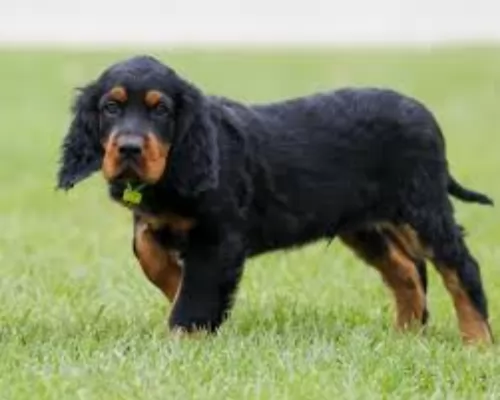 The Gordon Setter is a large dog, capable of reaching up to 69cm in height and weighing up to 36kg in weight.
The Gordon Setter is a large dog, capable of reaching up to 69cm in height and weighing up to 36kg in weight.
He belongs to the Setter family and is somewhat heavier than the other Setter breeds. Setter dogs are classified as sporting- or gun dogs. He is a beautiful dog with a pitch black coat with tan markings found around the chest, muzzle and paws as well as those two familiar tan dots above each eye.
Sometimes you can find a small amount of white on the chest. The coat is straight and silky but it can be slightly waved with feathering around the legs, chest, ears and tail. Both the tail and the ears of the dog are also long and feathery. The Gordon has an intelligent, dignified look about him.
The Gordon Setter is a confident, fearless, loyal and affectionate dog. They do well with their human families, when there are other pets in the house as well as children.
He can be a boisterous dog so training and socialization will become necessary. Your Gordon Setter is an intelligent dog and also a dog ready and willing to learn. He is calm and even-tempered but playful too.
He isn’t a dog suited to life in the city if there isn’t an adequately sized garden. He is essentially a country life dog well suited to farms or large fenced gardens.
 The Formosan Mountain Dog is very child-friendly. He is affectionate and loyal to his family and protective of his children.
The Formosan Mountain Dog is very child-friendly. He is affectionate and loyal to his family and protective of his children.
He is intelligent and has exceptional hunting skills. He is a good guard dog due to his alertness, but they can be fear-aggressive.
He is very adaptable to living in any location as long as there is somewhere for him to get adequate exercise. He is friendly to people and animals.
He is intelligent and learns quickly.
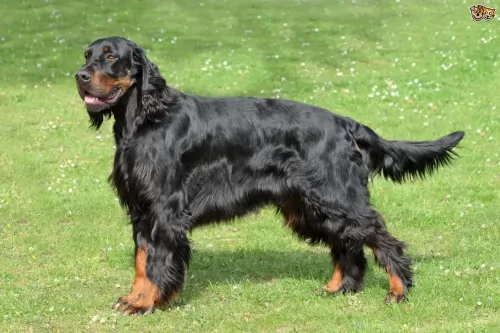 Beautiful to look at, the intelligent and even-tempered Gordon Setter has everything to be confident about. He loves the attention he gets from his human family and is always looking for a pat.
Beautiful to look at, the intelligent and even-tempered Gordon Setter has everything to be confident about. He loves the attention he gets from his human family and is always looking for a pat.
He can be stubborn and he certainly won't like the idea of being left cut off from his family for long periods of time as he is a social dog with those he knows and loves.
The Gordon Setter is energetic and playful so he will need regular exercise. When you bring a Gordon Setter into your home, you bring in a wonderfully loyal pet and companion.
 Because there have not been any studies done on the health of the Formosan Mountain Dog, there is not a lot known about any inherent or genetic health issues. It would seem that some bloodlines are healthy, and others have some serious issues. Especially because there are no studies, it is important for breeders to test for eye issues and skeletal issues through the Orthopedic Foundation for Animals and the Canine Eye Registration Foundation.
Because there have not been any studies done on the health of the Formosan Mountain Dog, there is not a lot known about any inherent or genetic health issues. It would seem that some bloodlines are healthy, and others have some serious issues. Especially because there are no studies, it is important for breeders to test for eye issues and skeletal issues through the Orthopedic Foundation for Animals and the Canine Eye Registration Foundation.
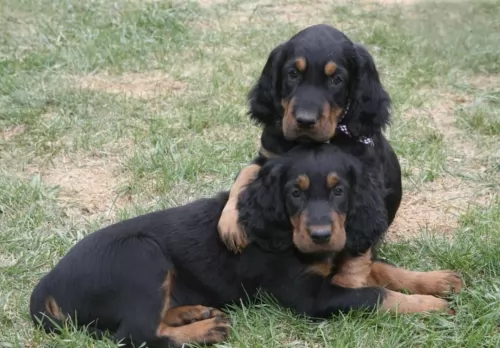 Life expectancy for the Gordon Setter is usually about 10 to 12 years and with good nutrition and care, your Gordon can easily reach 12 years of age.
Life expectancy for the Gordon Setter is usually about 10 to 12 years and with good nutrition and care, your Gordon can easily reach 12 years of age.
Every dog is prone to some common health issues and these include among others hip dysplasia, gastric torsion or bloat, retinal atrophy and ear infections.
Large dogs are more prone to hip dysplasia. The disease is a malfunction of the hip joints causing pain and loss of function in the rear legs.
This eye conditon just gets worse over time and can lead to vision loss.
An under-active thyroid causes a decrease in metabolism. Symptoms of hypothyroidism in dogs include weight gain, obesity, cold intolerance, changes in the skin and coat like hair loss and your dog is lethargic.
This can be very dangerous with your pet as the stomach is swollen and the stomach rotates and twists and can lead to death.
 Feed a high-quality puppy food for medium size dogs at the rate of a ¼ cup twice a day until 8 months then ½ to ¾ twice a day until 12-16 months.
Feed a high-quality puppy food for medium size dogs at the rate of a ¼ cup twice a day until 8 months then ½ to ¾ twice a day until 12-16 months.
1 to 2 cups of high-quality dry food split into 2 meals per day.
Generally healthy breed. Keep clean and watch for mites.
This is an energetic breed and he needs a lot of exercise. He must have at least an hour of exercise daily but the more, the better. He loves swimming and jogging with his people. He’s athletic, smart and agile. He does well with field trials, tracking, agility, and obedience.
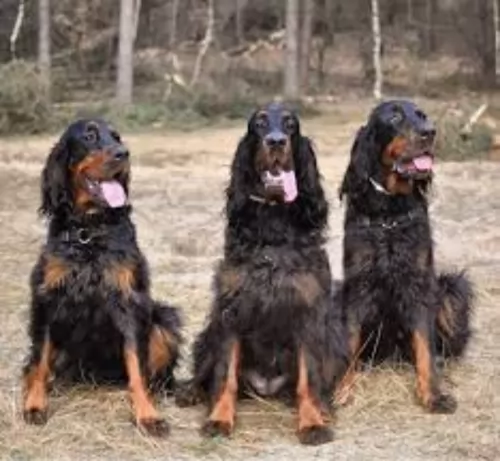 Gordon Terriers are energetic dogs so he is going to require a good deal of exercise each day. Take him with you on your walks and make sure that you give him lots of ball games and rope games.
Gordon Terriers are energetic dogs so he is going to require a good deal of exercise each day. Take him with you on your walks and make sure that you give him lots of ball games and rope games.
All Gordon Setters shed, and their coat will require a good brushing at least twice a week. Check nails, teeth and ears regularly. Brush teeth at least twice a week to prevent dental decay.
As a working dog your Gordon Setter has a special need for a high fat content diet. You can include some raw meat in his high-energy dog kibble. He can also have some cooked brown rice, chicken and vegetables added into his kibble from time to time. Make sure he has access to fresh, cool water.